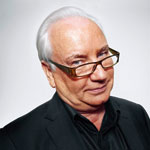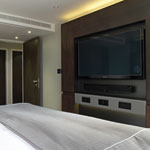Great expectations – the advance of technology
As consumer technology continues to advance at an unrelenting rate, it's up to hotels to decide how best to keep up with the latest trends. Ross Bentley investigates
If you want to find out what is cutting edge in guest-facing hotel technology, there is no better place to look than the Mandarin Oriental Hotel Group - recognised leaders in this space.
"I report directly to the CEO and we share a philosophical belief that technology is a key differentiator, and central to our strategy," asserts the group's chief information officer, Monika Nerger, who says the company stays ahead by studying trends in the consumer technology sector and through "in-depth conversations with top-tier guests".
One trend Nerger has seen is the growing tendency for guests to bring their own content with them into hotels. Movie downloads, home-made videos and digital photos stored on guests' laptops, iPads and other tablet computers are now commonplace, she says, and are fuelling a move away from in-house video on-demand services to a call for functionality that allows them to view this content on the 42in-plus flatscreen TVs that are standard across the group's 10,000 rooms worldwide.
"And they also want to do it wirelessly and without the need to read a 300-page guide book," she adds.
Technologies like Apple's AirPlay, which allows users to stream music from their iTunes wirelessly, already exist but Nerger's team are currently working to develop an in-house solution that will allow guests to stream whatever media they have on whatever device to the big screen without wires.
This tendency towards uber-personalised viewing is also visible in the changing demands of international guests. One example of this, Nerger says, is the marked increase in demand for Arabic content from guests in the London and US properties.
"They might request a specific sporting event and ask if we can also organise commentary in Arabic, for example," says Nerger, who, to this end, is trialling a product called MediaBox that delivers some 300 Arabic, Kurdish, Turkish stations over the internet.
Choice of channels is also something stressed by Sky's group sales director, Bruce Cuthbert. In many hotels, he says, the guests' television viewing experience "has fallen behind in terms of what they have come to expect regarding breadth of channel choice and quality of service".
With this in mind, he says the Sky box per room service can now provide guests with more than 300 channels including over 50 HD channels and a dedicated 3D channel.
Because Mandarin Oriental's guests are, as Nerger puts it, "the top one per cent of global travellers", who own all the requisite "technological accoutrements", she admits there is a pressure to ensure her hotels provide them with the best technology available. But, she warns, hoteliers who want to play this game should think carefully about how they do it.
There's no point, she says, investing huge amounts putting an iPad in every room, when half the guests will bring their own anyway and new versions of the popular tablet are released every year or so. Instead, Nerger's current approach has been to initiate work on developing an app that can be downloaded on to a guest's own device, regardless of the platform, which will then allow guests to control the television and the room's lighting and temperature controls.
MOVIE-ON-THE-GO In a similar vein, at the group's Paris property, a technology, developed by German internet protocol television (IPTV) specialists Deuromedia, has already been installed that allows guests to watch the same content on their TV and iPad simultaneously, so they can wander off to a different room or part of the hotel and still watch the movie on-the-go.
A different slant is given by Olivia Byrne, director at the Eccleston Square Hotel in London's Pimlico, which reopened this autumn to much fanfare about the technology it offers guests (see opposite). "Given the tech explosion, hotel amenities are becoming increasingly aspirational," she says.
"Each technological breakthrough has its own launch window. When a hotel is undergoing a full renovation, the hotelier needs to take into account which technological windows are going to be available at the time of opening."
In the case of the Eccleston, a number of significant technological windows became available, including fibre optic distribution, voice over internet protocol (VoIP) phones, 3D TV and the iPad2, which are found in every room.
"It would have been a major missed opportunity not to take full advantage of these," adds Byrne.
Discuss the iPad with hotel technologists and it very soon becomes clear this extremely popular gadget could cause them serious headaches. Mandarin Oriental, for example, has recently completed a million-pound overhaul of its Wi-Fi access points across the whole estate to accommodate the growing number of users of the device.
This, says Graeme Powell, European managing director at digital services provider iBAHN, is because the antenna in iPads is not as strong as that found in laptops and, therefore, current Wi-Fi infrastructures in hotels do not provide adequate coverage, "especially when iPad users tend to move around the room a lot more", he says.
But it is not just the iPad's antenna that, according to Powell, will cause hotels issues. He says the iPad is "designed, built and used for the viewing and dissemination of video", meaning as more people bring them into hotels, so the demand for more bandwidth will multiply on networks that are already straining to provide guests with a satisfactory online experience.
CLOUD COMPUTING Powell predicts hotels' networks will experience further strain still as cloud computing becomes established and more users store their data online rather than on devices, although commentators disagree on how soon we will see widespread availability of distributed cloud computing.
One area where experts do generally agree is that internet, TV programming and room services are converging and that soon it will be commonplace for all these functions to be delivered through the same box - or as Nerger calls it "the glass".
To this end, Doing Business at Comet, the business arm of the high-street retailer, has released Netspot - a technology that allows TV channels, internet movies, Microsoft office applications and access to a hotel's property management system (PMS) system to be delivered via the television screen.
"Guests today expect so much more in the form of entertainment and connectivity," adds business development manager Nick Youle.
Earlier this summer, Philips also unveiled MediaSuite, an Internet-enabled TV aimed at the hospitality industry, which combines catch-up TV and online apps with traditional television.
"This is the future," says Ian Millar, professor of information technology at the renowned Ecole Hôtelière de Lausanne and also a member of the MediaSuite co-creation team.
But Millar argues that rather than try and keep up with the latest technology at all costs, the majority of hotels should concentrate on doing the basics well.
"There are still a lot of hotels that don't have a good enough basic package - they only offer wired and paid-for internet and the quality of that service is poor. Many don't have flat screen TVs," he says.
Millar says the best hotel he has stayed in recently for getting the balance between technology and service right is the Arch in West London. "The internet was fast and free, the rooms were designed well and incorporated internet radio and a TV in the bathroom. The beds were amazingly comfortable and the all-round service was great," he says.
"In the lounge areas, there were discreet buttons in the wall that paged staff. There weren't staff members wandering around, so the atmosphere was homely, but staff were there quickly if you called.
"That's a good example of a hotel using technology in an intelligent way to improve service," Millar adds.
Hotel technology in the future
Made to Measure In 20 years' time, less of us will bother to go on holiday with a bag packed with clothes. Ray says: "Thanks to globalisation, the cost of making clothes has collapsed, meaning holiday-makers can order shirts and trousers over the internet with all their measurements registered, perhaps using a 3D-avatar, and have them waiting at the hotel when they arrive."
Holo-theatres According to Ray, distinguishing between radio, TV and internet will be old-fashioned. He says: "All forms of media will have converged and be available from one access point. Films and sporting events will be delivered via holo-theatres - that is 3D images projected into the centre of the room with viewers sitting around the images."
Intelligent luggage Each piece of luggage will become a node on the internet, says Ray. "It will be commonplace to have luggage containing a chip, constantly communicating with the internet, so people know where it is at all times. Bags won't just be inanimate but active, and more travellers will journey without their luggage as they are routed separately."
What a reception As reception desks are essentially a place to house computers and papers, many hotels will have done away with them by 2030. Ray says: "Guests will be checked in using hand-held devices, meaning we will see the return of the elegant salon foyer where people will be greeted by name at the door before being reunited with their intelligent luggage."
Digital detox
An increasing number of hotels are turning their back on technology and offering guests the chance to escape from their gadgets for a short time by offering so-called "digital detox" breaks.
Inspired by a recent survey by American Express that found 79% of travellers remain "connected" on their holiday, Lifehouse Country Spa Resort in Essex is offering stressed executives the chance to get away from it all by asking them to check their BlackBerrys and iPhones into the "BlackBerry Creche" upon arrival before enjoying a series of pampering treatments.
Earlier this autumn, the Marriott's Renaissance Pittsburgh hotel in the USA went one step further with its "Zen and the Art of Detox" weekend package, requesting not only that guests surrender their devices at check-in but also replacing the room's television and phone with books.
high tech rooms: the Eccleston Square Hotel
Its state-of-the-art bedroom interiors feature 46in 3D Neo Plasma TVs, complimentary high-speed wireless internet, a library of complimentary 3D Blu-ray films, and complimentary calls to London numbers, with international calls at voice over internet protocol (VoIP) cost, using the same technology as Skype.
Advanced features include fingertip control pads for every possible function - lighting, curtains, TV, soundtrack and temperature - which can be preset by the guest prior to their arrival. An iPad2 in every room will allow you to manage your entire guest experience.
"Technology will always remain aspirational and hotels today can still offer combinations of technology which are generally unavailable to most households," says director Olivia Byrne.
Technology timeline
â- 1990 Pay-for movies become established in hotels
â- 1992 The world wide web is released to the public
â- 1999 Wi-Fi starts to get used commercially and before too long hotspots are springing up everywhere.
â- 2000s Taped-based distribution of movies in hotels is replaced by digitised content
â- 2001 The iPod Classic launches and soon becomes the de facto standard portable digital music player
â- 2002 3G or 3rd generation mobile telecommunications starts to take-off and is promoted as the internet for mobile phones
â- 2006 Channel 4's 4oD is launched
â- 2007 BBC iPlayer is launched
â- 2008 The iPhone 3G is launched and smartphones take off
â- 2009 High definition TV (HDTV) takes off and over the next few years more content becomes available
â- 2010 The iPad is released and sceptics are forced to eat humble pie as more than three million are sold in the first 80 days
â- 2011 Network operators gear up to deliver 4G or mobile broadband aimed at laptop computer wireless modems, smartphones and other mobile devices. The iPad 2 also becomes available and is both lighter and faster than its predecessor
î¬ 2012 Digital television switchover throughout UK expected to finish












